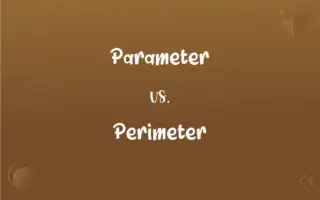Bond Dipole vs. Molecular Dipole: What's the Difference?
Edited by Aimie Carlson || By Harlon Moss || Published on December 10, 2023
Bond Dipole refers to unequal electron sharing in a chemical bond, creating partial charges. Molecular Dipole refers to overall polarity of a molecule due to combined bond dipoles.

Key Differences
Bond dipole refers to the polarity that arises in a chemical bond because of the unequal sharing of electrons between atoms. Molecular dipole, on the other hand, is the net polarity of an entire molecule, resulting from the summation of all bond dipoles.
In a bond dipole, the difference in electronegativity between two bonded atoms creates a partial positive and negative charge. In contrast, a molecular dipole is determined by both the individual bond dipoles and the geometry of the molecule, which can enhance or cancel out these dipoles.
The bond dipole is a localized concept, focusing on individual bonds within a molecule. The molecular dipole, however, is a more holistic property, considering the molecule as a whole and its overall charge distribution.
Measuring bond dipole involves looking at specific bonds, assessing the electron distribution between atoms. Molecular dipole measurement considers the molecular structure and the spatial arrangement of bonds to understand the molecule's overall polarity.
Bond dipoles can exist in nonpolar molecules if their effects are symmetrical and cancel out, resulting in no molecular dipole. However, a strong molecular dipole always indicates the presence of significant bond dipoles that do not cancel out in the molecular structure.
ADVERTISEMENT
Comparison Chart
Focus
Specific chemical bonds
Entire molecule
Polarity Source
Electronegativity difference
Combined effect of all bond dipoles
Geometric Influence
Limited to bond length and atoms
Dependent on molecular shape
In Nonpolar Molecules
Can exist if symmetrical
Absent if bond dipoles cancel out
Measurement
Electronegativity and bond properties
Molecular geometry and bond dipoles
ADVERTISEMENT
Bond Dipole and Molecular Dipole Definitions
Bond Dipole
A bond dipole arises when bonded atoms have different abilities to attract bonding electrons.
The carbon-oxygen bond in carbon dioxide has a bond dipole due to oxygen's greater electron affinity.
Molecular Dipole
A molecular dipole is the cumulative effect of all bond dipoles in a molecule, influenced by molecular shape.
Ammonia exhibits a molecular dipole because its trigonal pyramidal shape doesn't cancel out bond dipoles.
Bond Dipole
Bond dipole represents the polarity of a bond caused by the difference in electronegativity of bonded atoms.
In hydrochloric acid, the bond dipole is evident as chlorine pulls electrons more strongly than hydrogen.
Molecular Dipole
A molecular dipole is the overall polarity of a molecule resulting from the combination of its bond dipoles.
Water has a strong molecular dipole due to the arrangement of its polar O-H bonds.
Bond Dipole
A bond dipole is the separation of electrical charge in a chemical bond due to unequal electron sharing.
In a water molecule, the bond dipole between oxygen and hydrogen creates a partial negative charge on oxygen.
Molecular Dipole
Molecular dipole refers to the net electric charge distribution across a molecule.
Carbon dioxide, despite having polar bonds, lacks a molecular dipole due to its linear geometry.
Bond Dipole
A bond dipole is a vector quantity representing the direction and magnitude of polarity in a chemical bond.
The bond dipole in carbon monoxide points from carbon to oxygen due to oxygen's higher electronegativity.
Molecular Dipole
Molecular dipole indicates whether a molecule is polar or nonpolar based on its overall charge distribution.
Methane lacks a molecular dipole as its tetrahedral shape evenly distributes bond dipoles.
Bond Dipole
Bond dipole indicates the uneven distribution of electrons between two covalently bonded atoms.
In ammonia, the nitrogen-hydrogen bonds exhibit bond dipoles due to nitrogen's electronegativity.
Molecular Dipole
A molecular dipole arises from the vector sum of all individual bond dipoles within a molecule.
In hydrogen chloride, the molecular dipole is aligned with the bond dipole due to its linear shape.
FAQs
What is a bond dipole?
A bond dipole is the polarity in a chemical bond due to unequal electron sharing between atoms.
How is a molecular dipole different from a bond dipole?
A molecular dipole is the net polarity of a molecule, derived from all its bond dipoles and influenced by molecular shape.
What causes a bond dipole?
A bond dipole is caused by the difference in electronegativity between two bonded atoms.
Can a single bond have multiple bond dipoles?
No, a single bond has only one bond dipole, reflecting the electron distribution between the two atoms.
Is the size of a bond dipole always equal in symmetrical molecules?
In symmetrical molecules, bond dipoles are typically equal and symmetrically arranged.
How does molecular size affect the molecular dipole?
Molecular size doesn’t directly affect the molecular dipole, but larger molecules can have more complex arrangements of bond dipoles.
Can a molecule with bond dipoles be nonpolar?
Yes, if the bond dipoles are symmetrically arranged and cancel each other out, the molecule can be nonpolar.
Can a molecule with nonpolar bonds have a molecular dipole?
It's rare, as molecular dipoles typically arise from polar bonds, but molecular shape can sometimes lead to a dipole.
Is molecular dipole dependent on molecular geometry?
Yes, molecular dipole is significantly influenced by the molecular geometry which can enhance or negate bond dipoles.
Does a molecular dipole always indicate a polar molecule?
Yes, the presence of a molecular dipole usually means the molecule is polar.
Are bond dipoles always in the direction of the more electronegative atom?
Yes, bond dipoles point towards the more electronegative atom.
Do all molecules have a molecular dipole?
No, molecules with symmetrically arranged bond dipoles or nonpolar bonds may lack a molecular dipole.
Can identical molecules have different molecular dipoles?
No, identical molecules will have the same molecular dipole due to consistent bond dipoles and molecular geometry.
Can a molecule’s molecular dipole change?
The molecular dipole of a molecule remains constant unless its shape or bond polarities change.
How do you measure a bond dipole?
A bond dipole is measured by assessing the difference in electronegativity between the bonded atoms and the bond’s characteristics.
Does a stronger bond dipole mean a stronger molecular dipole?
Not necessarily, as the molecular dipole also depends on the arrangement and number of bond dipoles.
Can environmental factors influence molecular dipoles?
Environmental factors generally don’t influence molecular dipoles, as they are intrinsic properties of the molecule.
Are bond dipoles important in organic chemistry?
Yes, bond dipoles are crucial in organic chemistry for understanding molecular interactions and reactivity.
Are bond dipoles relevant in ionic compounds?
Bond dipoles are less relevant in ionic compounds, where electron transfer, not sharing, predominates.
Is it possible to predict molecular dipoles theoretically?
Yes, molecular dipoles can be predicted using computational methods that consider bond dipoles and molecular geometry.
About Author
Written by
Harlon MossHarlon is a seasoned quality moderator and accomplished content writer for Difference Wiki. An alumnus of the prestigious University of California, he earned his degree in Computer Science. Leveraging his academic background, Harlon brings a meticulous and informed perspective to his work, ensuring content accuracy and excellence.
Edited by
Aimie CarlsonAimie Carlson, holding a master's degree in English literature, is a fervent English language enthusiast. She lends her writing talents to Difference Wiki, a prominent website that specializes in comparisons, offering readers insightful analyses that both captivate and inform.






































































